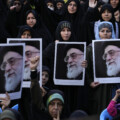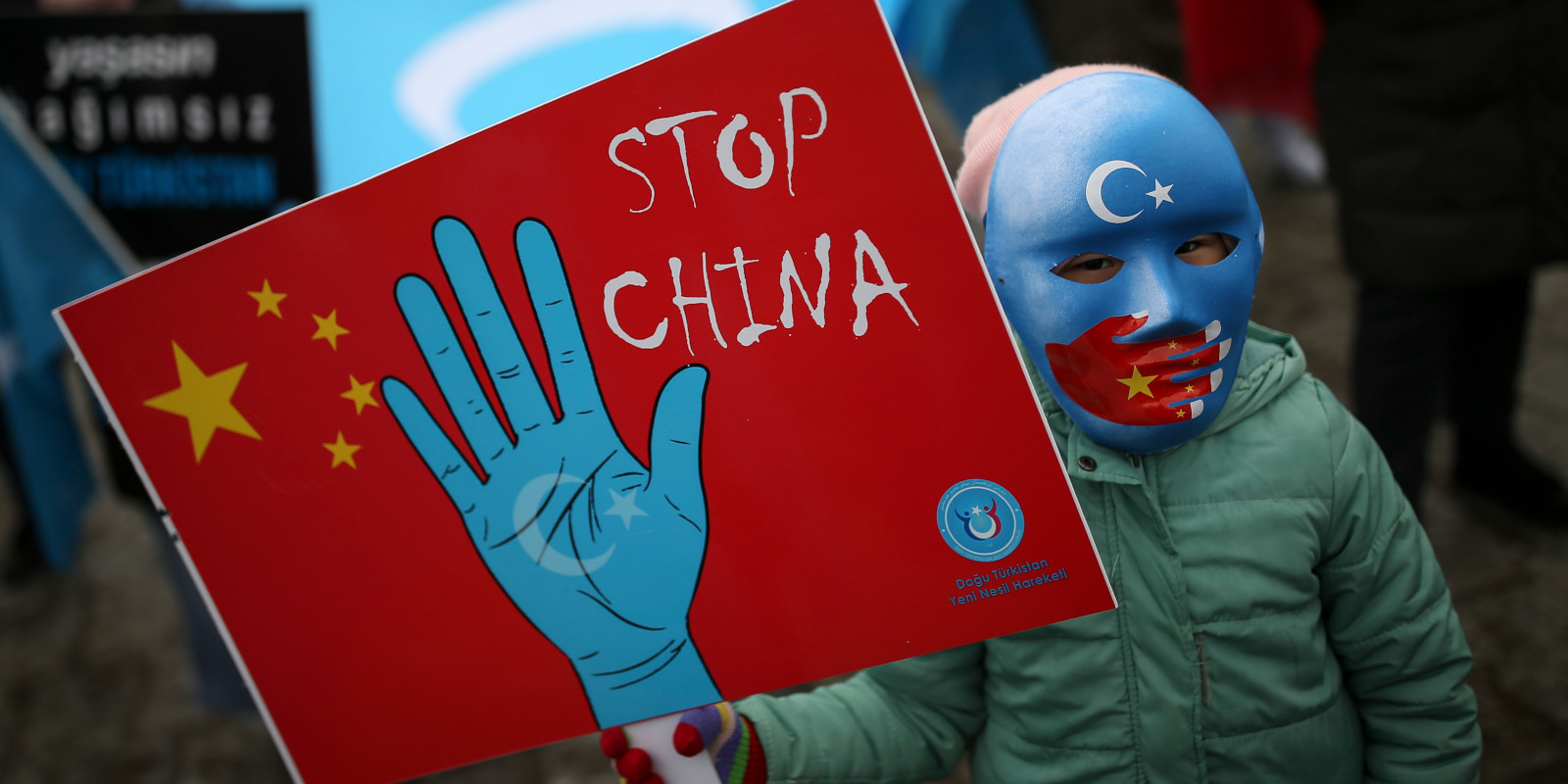Today’s episode of Hub Dialogues features George Washington University professor Sean Roberts discussing his new book on the systematic repression of the Uyghur people in China, the Western response to this persecution, and the utility (or not) of labeling this genocide.
You can listen to this episode of Hub Dialogues on Acast, Amazon, Apple, Google, Spotify, Stitcher, or YouTube. A transcript of the episode is available below.
Transcripts of our podcast episodes are not fully edited for grammar or spelling.
SEAN SPEER: Welcome to Hub Dialogues. I’m your host, Sean Speer, editor-at-large at The Hub. I’m honoured to be joined today by Sean Roberts, an associate professor of International Affairs and Anthropology at George Washington University. He’s the author of the fascinating and thought-provoking book, The War on the Uyghurs: China’s Internal Campaign against the Muslim Minority.
Thank you for joining us today, Sean, and congratulations on the book.
SEAN ROBERTS: Thank you very much for the invitation.
SEAN SPEER: Maybe to start the conversation, can you please give listeners a bit of background on China’s Uyghur population? How long have they lived in parts of China? What’s their relationship to the Chinese state? And why in your book do you argue that modern China’s relationship with the Uyghurs is best characterized as colonial?
SEAN ROBERTS: Yeah, well, so the Uyghur population, I think can be perceived of as the indigenous population of this region that’s now part of the People’s Republic of China. Now, of course, no indigenous people really were necessarily the first inhabitants, or at least it can’t be proven, but the Uyghur people live in the center of Eurasia. So, they’re an amalgamation of numerous peoples who’ve crossed that area over the centuries.
But when we look at the period when this region really became incorporated into first the Qing empire and then later the People’s Republic of China, the Uyghur people had already long lived in this area and had developed a very unique culture that has a strong attachment to this territory as well. Which is part of, I think, the conflict between Uyghurs and the Chinese state, because the Chinese state has its own designs on that territory and the Uyghur people are not necessarily in agreement with those.
SEAN SPEER: What factors have led to the central Chinese government’s targeting the Uyghurs? Is there any basis for the idea that the Uyghur population is “polluted by religious extremism?”
SEAN ROBERTS: So, there’s been, as I mentioned this long, tenuous relationship with the Chinese state and the weak or people largely because the weak or people view themselves as a nation, and they view this territory as their homeland. But there have been different ups and downs over time with regard to their relationship with the state. There have been some periods, where, particularly under the People’s Republic of China, there was a sense that perhaps China was creating a more inclusive state, which encompasses the Uyghurs on their own terms with their own culture right after the revolution, and in the early 1950s, and then again in the 1980s.
But I think one of the things that precipitated the increased conflict became the development model of the Chinese state since the 1980s. And in particular, starting in the early 1990s—because China of course, since the 1980s, has opened up to the world. Prior to 1980, during the years of the cultural revolution, it was closed off from the rest of the world. But in large, opening up to the world is about economic trade and it’s about developing their industrial base. And in the 1990s, the People’s Republic of China already began looking at the Uyghur region as one region that needed to be further developed. I think for a long time they viewed the region as the buffer zone to keep people out, but when China started looking outwards, all of a sudden it became an important land port or bridge to the rest of the West, starting with Eurasia and having roots into the Middle East and Europe, which we now know in terms of the Belt and Road initiative.
And so that’s when you start to see more conflict, and in particular, with the fall of the Soviet Union, the Chinese Communist Party became almost paranoid about the possibility that ethnic minorities within China could separate from China and become their own states, like the newly independent states of the former Soviet Union at that time. So, there was a lot of attention to the Uyghur population and the Tibetan population, and, to a lesser extent but still, some attention, to the Mongolian population. And those are the three populations that are significant in size and have a very distinct homeland that’s within the borders of the People’s Republic of China.
In the 1980s, China did liberalize particularly in cultural spheres, so Uyghurs were able to start exploring Islam again after the Cultural Revolution. And you had kind of a renaissance in Uyghur culture writ large, and that included also in terms of Islam. I believe that there was a blossoming of believers in the region, but to say that they were necessarily extremist, I think, is very problematic. I think that that rhetoric really starts being used as we see after 9/11 when much of the world starts to look at Islamic religiosity as something that is almost intrinsically extremist.
SEAN SPEER: Okay, so that’s useful context, Professor Roberts, both for the relationship between the Uyghur people and the Chinese state, and the growing attention that the central government came to pay towards this population in the aftermath of 9/11.
Next, it would be useful to hear a bit about what Chinese policy has been vis-à-vis the Uyghur population. One occasionally hears about how they’re subjected to mass surveillance. Some of our listeners have probably heard of the so-called reeducation camps. Can you just give us a sense of what life has been like for the Uyghurs under this campaign of repression?
SEAN ROBERTS: Yeah, there’s been in, in some ways, increasing repression in the region since the 1990s, due to the context that I already explained. And I think, again, after 9/11, that became exacerbated by the narrative of Islamic terrorism and what the Chinese government previously had called separatists, they were now calling extremists and terrorists. There was a major change in 2017, I would say. And in fact, I started writing this book prior to that, and I was really focused on how the War on Terror, the Global War on Terror had impacted the Uyghurs. And then as I was writing it and doing my research around it, it kind of transformed in real-time where we saw all of a sudden after 2017, a police state like we’ve never seen. I would say anywhere just because of the technology involved; it hasn’t existed prior and this happen rather suddenly.
The first signs were that those of us who have friends who are Uyghurs living inside China lost contact with people. And Uyghurs in exile began telling us that they no longer could contact their relatives, and they were told by their relatives to no longer contact them. There were some other signs when we started to see the Chinese government demanding that Uyghur students abroad, particularly in Muslim states, return immediately to China. And then we started to see evidence of the building of these massive internment centres, prison-like structures throughout the region. It immediately seemed that people were disappearing into these internment centres, which we gradually learned more information about. Since 2017, we’ve seen perhaps up to a tenth of the population going through these internment centres. We’ve also seen the majority of intellectuals in the community have gone directly to prison, and that started almost immediately the same time the internment centres were being built.
And the other aspect I think of the repression, as you mentioned, is the high-tech surveillance, which really began a little bit earlier. There’s evidence that the Chinese state was procuring the equipment for this already in 2014, and it started to go into effect already in 2015-16. But basically, there’s, in addition to massive artificial intelligence surveillance, there is a database where data is collected on every individual, that has information about your profile. When a person goes through a checkpoint, which also appeared throughout the region, the security officers could quickly bring up your profile and decide whether you were a suspicious person; suspected perhaps of being an extremist or potential terrorist, and that was enough to have you sent to an internment centre.
Really, another part of the story behind that is, I think that the dual repression of having this omnipresent surveillance, and the threat of going into either a prison or an internment centre has made the population unable to voice any sort of concerns with government policy, and government policy has moved more and more to outright assimilation. That’s kind of the phase that we’re seeing now.
SEAN SPEER: Before we get into the world’s response to these developments, it’s worth underscoring the point about the context of the Global War on Terror and the case on the part of the Chinese government that this is part of an overall effort to address Muslim extremism within its borders. One of the key insights from the book is that you mostly challenge the claim that this is a case of Muslim extremism and that that’s, by and large, a pretext for action that is unsubstantiated.
Can you just elaborate on your analysis with respect to the claim that China’s policy should be perceived as tackling Muslim extremism just as other countries around the world, including of course ours, are involved in?
SEAN ROBERTS: Yeah, I think there was a global overreaction in many ways to the 9/11 events. You know, as security experts have been saying for over a decade that the amount of money—at least in the United States, I don’t know about in Canada—that’s put into counterterrorism isn’t justified by the threat we have seen from terrorists. And I think another problem with the Global War on Terror is that it became very much a vehicle of ethnic, religious profiling. There was an immediate suspicion that if somebody was Muslim then they potentially were terrorist. And that, I think, is very dangerous in terms of the kind of the way it seeps into people’s consciousness. It creates this global Islamophobia. So, that’s certainly part of it.
I think another part of it is that a lot of states around the world after 9/11 began looking at any kind of domestic challenge they saw, and if it was a Muslim population, they immediately tried to characterize that as terrorism. There are situations in North Africa, there are situations even in the Muslim world, where domestic opponents are portrayed as terrorists when they have no connection to Al Qaeda or ISIS, or any sort of necessarily even a jihadist movement.
The case with the Uyghurs that’s interesting is that through most of the time that the Chinese government was claiming it faced this massive terrorist threat, there were virtually no Uyghur jihadis, which is kind of odd. I mean, there are jihadists I’m sure from most major cities in the United States and Canada, and you would think in this disgruntled population there would have been a lot of Uyghur jihadists.
There was a small group that did make videos threatening the Chinese government and that I think really aggravated the Chinese government. And then eventually, in Syria, we see a group of Uyghurs emerging as jihadists and I talk about this in my book, is a self-fulfilling prophecy. If you start labeling dissent as terrorism, at a certain point, people are going to say, “Well, that maybe that’s the only option.”
SEAN SPEER: So, to come to the world’s response to these developments, we’re speaking today, and just in recent weeks we’ve had a high-profile American CEO say that “Nobody cares about the Uyghurs.” He since apologized, of course, but his original comments do reflect an implicit view of many Western business leaders and policymakers. What do you make of the world’s weak response to the treatment of the Uyghurs in China?
SEAN ROBERTS: Well, I’m not entirely surprised. And I make this case in the conclusion to my book that I think that really there needs to be a grassroots response to this problem because states have lots of reasons not to bring up this issue in a significant way. I mean, even the United States has been vocal on this issue, but whether that’s been complemented with actual substantive actions is another question.
And I think that really the primary issue why states don’t want to bring up this issue is the way that China is interconnected economically with the entire rest of the world. And there are economic consequences to be had of criticizing China on this. One of the things we find we’ve found in the last several years from the internment camps is there’s been a program that brings Uyghurs into essentially coerced labor situations, residential labour situations where they have no movement. And those factories are working on the supply chains of lots of our favorite brands.
On top of the comments of the CEO and President of the Golden State Warriors, there’s also been evidence recently that Burton Snowboarding has a store in the Uyghur region, and the CEO when asked about it said, “Well, I’m I know nothing about this problem.” So I think I think there are economic incentives not to push back on this with China, whether it has to do with the supply chains that you have in China, or whether it just has to do with the potential blowback of having trade with China disrupted.
I think that really makes it a task that has to be taken on by consumer advocates, people who are basically talking with their pocketbooks, whether they’re buying things or not. You can question the success of it—there have been attempts to do this in the past with apartheid in South Africa, the Boycott, Divestment, and Sanctions movement in support of Palestine. And these movements at least keep this the point on the agenda in making sure that there are some economic consequences for doing these kinds of things to an entire ethnic group.
SEAN SPEER: You said that you’re not surprised that these economic factors have overwhelmed businesses and many Western policymakers in terms of taking concrete action in response to this campaign of repression. Are you more surprised that the cause of the Uyghurs hasn’t resonated more in the broader Muslim world, which you characterize both in the book and in other interviews as being mostly silent?
SEAN ROBERTS: Yeah, I’m somewhat surprised. When I talk about states, it doesn’t really matter if it’s a Muslim-majority state or another state. Most Muslim-majority countries are heavily entangled with China economically. And I do think it’s important to note that I’m starting to see increased activism within Muslim civil society with regard to this issue. I think that that’s important. But of course, it depends on the state we’re talking about, and a state like Indonesia, where there is a fairly robust civil society, it’s on people’s agenda. In Turkey as well. In Saudi Arabia, that doesn’t happen because you don’t have that civil society. So I think it does depend.
In Central Asia, which is bordering on China, there’s a significant Uyghur diaspora there, and there are other Turkic Muslims, many of whom have been subjugated to the same policies as the Uyghurs inside China. There, the governments are also completely beholden to China economically, and they feel that there’s no way they can push back. So yeah, it’s absolutely discouraging, but it’s not entirely surprising.
And in terms of the comment made by that CEO, I guess he was at least being somewhat honest from the perspective of the global business community. I think it was very insensitive, because when I saw it, the first thing I thought of is, “There are so many Uyghurs in the diaspora who are feeling so much pain because they have no contact with their, their family members, and they have no idea what’s happened to them.” And for those people that was, that was very crushing to hear.
SEAN SPEER: On the question of language, and how we talk about these issues, we’ve had a debate in Canada about whether it’s appropriate to describe China’s policy vis-à-vis the Uyghurs as a form of genocide. Two questions for you. One, do you think it’s productive to use the language of genocide? And two, would you personally characterize Chinese policy as a form of genocide?
SEAN ROBERTS: Well, so first of all, I make the case in my book that it’s very much similar to the cultural genocides that are usually associated with indigenous peoples, if we’re talking about the First Nations in Canada, Native Americans in the U.S., Aboriginals in Australia and so on. This experience, I think, is very, very similar, both in intent and in what’s happening to the people as a whole. Now, there is a big debate, and not being a legal expert, I don’t know what’s the right point of that in terms of whether we want to suggest that an attempt to wipe out a people’s culture and identity should be considered genocide or whether it’s only so if it is involving mass killing. That becomes kind of an academic and legal debate.
But I do think it’s an interesting question you raise about the utility of using that language. I was thinking about that earlier today, actually, because reflecting on it I think it’s had both positive and negative impact on the Uyghur movement to bring attention to what’s happening. I think that it’s positive in the sense that it does it has gotten the world’s attention. It’s negative because then the question is, is this genocide or not? Not is this an atrocious violation of these people’s human rights or not?
I think that, in many ways, the intent of what’s happening is very much to dispossess these people of their land, destroy their identity, wipe out their culture, and forcibly assimilate them. And that’s, that’s very similar to the experience that a lot of indigenous peoples have had. And that’s why, throughout much of my book, I bring up the parallels between the experiences of other indigenous peoples to that of the Uyghurs.
SEAN SPEER: The book, of course, is The War on the Uyghurs: China’s Internal Campaign Against the Muslim Minority. Professor Sean Roberts, thanks for joining us today on Hub Dialogues and sharing your insights and analysis on this important topic.
SEAN ROBERTS: Yes, thank you for inviting me and also let me make your listeners aware that there is an audiobook now as well for The War on the Uyghurs. Thank you.
Recommended for You

The end of Iran’s clerical rule and wine is a tragic casualty in Trump’s tariff war: The Hub’s can’t-miss predictions for 2025

Need to Know: Buckle up, we’re in for a wild ride in 2025

Richard Shimooka, Alexander Lanoszka, and Balkan Devlen: What Assad’s collapse in Syria says about Russia’s declining global power

Derrick Hunter: Donald Trump’s election could be the wake-up call Canada needs



